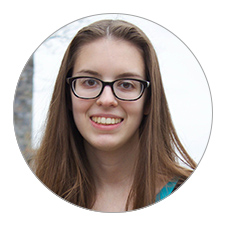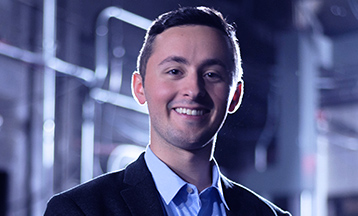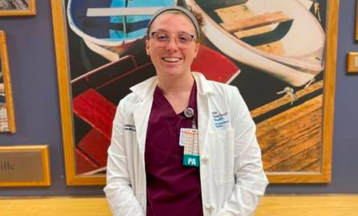-
About
- Friday, May 17, 6 p.m.
- Saturday, May 18, 11 a.m.
Commencement
Celebrating the Class of 2024
About
-
Academics
- Friday, May 17, 6 p.m.
- Saturday, May 18, 11 a.m.
Commencement
Celebrating the Class of 2024
Academics
-
Admission & Financial Aid
- Friday, May 17, 6 p.m.
- Saturday, May 18, 11 a.m.
Commencement
Celebrating the Class of 2024
Admission & Financial Aid
-
Student Life
- Friday, May 17, 6 p.m.
- Saturday, May 18, 11 a.m.
Commencement
Celebrating the Class of 2024
Student Life
- Athletics
Students talking in front of posters

Carolyn Turcotte
Hopewell Junction, NYAcademic School
ScienceCampus
New YorkIt is always recommended that incoming freshmen meet with their advisors early on in the semester to become familiar with them and their office hours. For Carolyn Turcotte, class of 2018, a double major in biochemistry and biomedical sciences, heeding this advice as a new student proved to be a momentous turn in her college career.
Carolyn stopped by Dr. Checci’s office “just to say hi.” “We talked a little about what I wanted to do as a career and I said I was really interested in genetics, so she was like ‘Great, join my lab.’ It was a very sudden thing,” Carolyn says.
Dr. Checci and her husband Dr. Andrews, both professors at Marist, run a genetics research lab on campus along with the help of four other students, including Carolyn. The team works with a model organism known as C.elegans, which Carolyn describes as essentially a “one-millimeter long worm.” By studying the process of meiosis on this organism, Carolyn and the other students are able to take this information and then apply it to humans.
“During meiosis, there has to be these breaks in DNA, and if they don’t get repaired properly they can lead to all sorts of problems like miscarriage, or disorders like down syndrome, or even a predisposition to cancer. So we’re focusing on the repair process for these breaks, ensuring they’re repaired properly so these problems don’t occur,” Carolyn says.
The research that Carolyn has done in Dr. Checci and Dr. Andrew’s lab has shaped both her college career and her future plans. She has presented her work at four different regional symposiums and had the opportunity to travel to Florida this past summer 2016 on a travel award from the Genetics Society of America. There she spoke at the 2016 Allied Genetics Conference, as one of only eight of around 150 applicants selected to present undergraduate research.
Carolyn describes this experience as an honor and says that she wasn’t even expecting to be picked at first because of how large the conference was and how many students applied.
“It was kind of nerve-wracking because I knew there would be a decent amount of people attending and I hadn’t talked in front of a particularly large audience before, so I was practicing for weeks on end to make sure that I got it down right,” she says. “But overall it was really fun. I got to see what other undergraduates were doing, mostly on completely different problems than me which were really interesting to see the diversity of students that were chosen,” she adds.
In addition to working in the research lab for 3-10 hours a week, Carolyn is an Honors Student and secretary of the American Chemical Society chapter on campus. Balancing this along with her double major can be difficult at times, but Carolyn says, “The workload is definitely tough sometimes but it’s worth it in the end.”
The tough but rewarding workload is in part what has inspired Carolyn to pursue a career in teaching undergraduates after first obtaining her Ph.D. “Ideally I would really like to spread my knowledge. I’m so thankful for what my professors have done for me, I think it would be really great to give back,” Carolyn says.
Though she is confident in her career path today, Carolyn never thought that she would pursue science when she was growing up. “When I was younger I didn’t really know completely what I wanted to do, I was actually really interested in stuff like art,” Carolyn says. But at the end of high school, she discovered epigenetics, or “the way the way our genetic information is modified by environmental factors,” she explains. “That really fascinated me.” From there, she was hooked.
Most recently, Carolyn was one of about 300 students to be chosen as a Goldwater Scholar, a scholarship for students planning to attend graduate school in the sciences or a STEM field. “I was ecstatic…I can’t believe I was chosen,” says Carolyn. For the first time in Marist’s history, the school had two Goldwater scholars in one year.
With all of her accomplishments, it seems strange to even think about Carolyn pursuing a field other than science, although she continues to enjoy art, particularly painting, in her spare time. Her passion for genetics and her time spent in the research lab has provided her with invaluable experiences, and even friendships. “I know some people think that being in a lab is kind of stuffy and you don’t really get to know anyone,” Carolyn jokes, “but there’s a really big group environment…were just like a big group of friends. We have inside jokes, we go out to dinner, it’s really a more social thing than a lot of people think.”
Perhaps one of the best things to come out of working in the lab is simply the feeling of working on something as a team that has the capacity to evoke real-world change. This was something Carolyn especially realized when she presented at the National Genetics conference. “It felt like I was doing something important. You don’t think that what you’re doing in undergrad might be seen by an international audience,” she says.
By Sarah Franzetti



